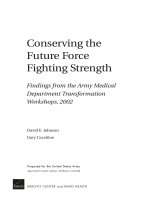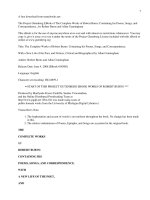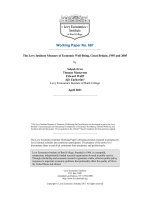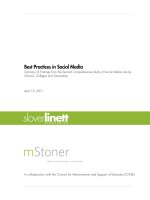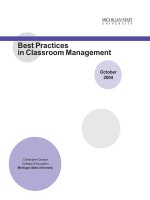Best Practices in Social Media / Summary of Findings from the Second Comprehensive Study of Social Media Use by Schools, Colleges and Universities docx
Bạn đang xem bản rút gọn của tài liệu. Xem và tải ngay bản đầy đủ của tài liệu tại đây (231.25 KB, 16 trang )
Best Practices in Social Media
Summary of Findings from the Second Comprehensive Study of Social Media Use by
Schools, Colleges and Universities
April 13, 2011
In collaboration with the Council for Advancement and Support of Education (CASE)
C A S E S o c i a l M e d i a S u r v e y
•
S u m m a r y T o p li n e Fin dings
•
A p r i l 1 3 , 2011
2.
Overview of findings
Background
Slover Linett Strategies Inc. and mStoner partnered with CASE for the second year in a row in order to
research educational institutions about their social media activities. Last year’s inaugural study was,
from what we could tell, one of the first studies conducted of the institutions themselves about how
they use social media.
Our overarching goal of this research is to create knowledge and resources to assist education
professionals as they assess and implement social media strategies for communication and engagement.
Some of the questions we hoped it would answer include:
How do professionals in education incorporate social media into their marketing and
communication strategies, initiatives, and campaigns?
What are their goals for social media?
Which social media sites and tools are in use in the education sector and which are most successful?
What are current best practices?
How do they staff their social media efforts?
How are schools measuring the ROI or impact of social media initiatives?
What contributes to the successful use of social media?
What are the barriers to the effective use of social media?
What does the near future look like for social media in education?
We conducted an online survey among a random sample of approximately 18,000 CASE members,
including contacts in admissions and enrollment departments – in the US and abroad. We received
nearly 951 (on par with last year’s response) across all types of institutions – a testament to the interest
in this topic.
We are just beginning to mine the data from this second round of research and will be releasing a full
white paper later in the year. If you’re interested in receiving this white paper, please email
For any questions about the study please contact:
Cheryl Slover-Linett
President
Slover Linett Strategies Inc.
773-348-9204
Thanks for your interest.
C A S E S o c i a l M e d i a S u r v e y
•
S u m m a r y T o p li n e Fin dings
•
A p r i l 1 3 , 2011
3.
Initial findings
Note that questions 1–7 are for profiling purposes to ensure the representativeness of the respondent
base.
1. Are you affiliated with an institution in:
North America 88%
Europe 8%
Asia Pacific 3%
Other 2%
2. [INTERNATIONAL ONLY] What type of institution do you work at?
Higher education/university 76%
Elementary/primary/secondary/high school 11%
Special focus institution (e.g. stand-alone business school, medical school, etc.) 7%
Further education/community college 2%
Other, please specify 4%
3. [NORTH AMERICA ONLY] What type of institution do you work at?
Doctoral/research university 31%
Baccalaureate (four year) college 25%
Master’s college or university 18%
Independent elementary/secondary school 14%
Associate’s (two year) college 6%
Special focus institution (e.g., stand-alone law school, medical school) 3%
Independent alumni association 1%
Institutionally related foundation 1%
System office 0%
Tribal college 0%
Other, please specify 2%
4. What is the name of your institution? [open-ended responses]
5. How many students does your institution have? Please include ALL students, both full- and part-
time.
Less than 1,000 18%
1,000 – 4,999 29%
5,000 – 19,999 31%
20,000 or more 23%
C A S E S o c i a l M e d i a S u r v e y
•
S u m m a r y T o p li n e Fin dings
•
A p r i l 1 3 , 2011
4.
6. Which best describes the level of your current position?
Executive director, director or manager 40%
Associate, assistant or deputy director/manager 27%
Specialist, coordinator, or administrative assistant 22%
Associate or assistant vice president 3%
Vice president, vice chancellor assistant head of school 3%
Dean, associate dean or assistant dean 2%
Other, please specify 4%
7. Which of the following describe your unit, that is, your immediate department or division? (Please
select all that apply).
Communications 44%
Alumni Relations 40%
Development (including Annual Fund) 36%
Marketing 30%
Advancement Services 19%
Enrollment management or Admissions 8%
Other, please specify 7%
8. Which one of the following best applies to your unit, that is, your immediate department or division?
(Please select one).
We have no current involvement with the use of social media 4%
Another unit manages all of our social media activities, without any input from us 3%
Another unit manages all of our social media activities, with input from us 12%
We handle our own social media activities, with some input from others 59%
We handle our own social media activities, without any input from other units 22%
C A S E S o c i a l M e d i a S u r v e y
•
S u m m a r y T o p li n e Fin dings
•
A p r i l 1 3 , 2011
5.
9. Which types of social media do you (your unit) use for each of the specific audiences below? (Please
select each that applies).
Percent using this type of social media for any audience:
Facebook (create/manage communities within Facebook) 96%
Twitter 75%
LinkedIn (create/manage communities within LinkedIn) 65%
YouTube
65%
Blogs 43%
An institutional website that is an aggregator of social
network sites
41%
Flickr 40%
Social communities provided by vendors through
proprietary software (such as Harris Connect, iModules,
etc.)
36%
A community created in-house by your unit using a tool
such as Ning (create/manage communities)
12%
Percent communicating with this audience at all (using any
type of social media):
Alumni 92%
Friends and Supporters 77%
Current Students 66%
Current Faculty and Staff 62%
Donors 61%
Prospective Students 56%
Parents of Current Students 47%
Media 43%
Parents of Prospective Students 41%
Employers 37%
High School Guidance Counselors 26%
Government Organizations 21%
C A S E S o c i a l M e d i a S u r v e y
•
S u m m a r y T o p li n e Fin dings
•
A p r i l 1 3 , 2011
6.
10. To what extent is each of the following goals for social media a goal for your unit?
Goals of social media
Not at
all
Not
much
Some-
what
Quite a
bit
Exten-
sively Mean
Engage alumni 2% 3% 11% 30% 54% 4.3
Create, sustain, and improve brand image 3% 4% 18% 40% 35% 4.0
Engage current students 9% 13% 26% 30% 23% 3.5
Increase awareness/advocacy/rankings 7% 11% 28% 32% 22% 3.5
Build internal community 9% 14% 31% 30% 17% 3.3
Engage admitted students 18% 15% 22% 24% 21% 3.2
Engage current faculty and staff 10% 18% 35% 23% 13% 3.1
Engage prospective students 23% 15% 17% 20% 26% 3.1
Engage the local community 14% 18% 32% 24% 12% 3.0
Recruit students 25% 17% 17% 19% 23% 3.0
Engage parents of current students 22% 20% 27% 21% 10% 2.8
Engage the media 22% 26% 26% 18% 9% 2.7
Conduct research on audiences (alumni,
students, etc.)
17% 28% 33% 16% 7% 2.7
Raise private funds 23% 26% 27% 14% 10% 2.6
Crisis and issues management 31% 27% 24% 12% 6% 2.4
Recruit faculty and staff 47% 30% 15% 6% 2% 1.9
11. What other goals does your unit have for its social media activities? [open-ended responses]
12. How would you rate the overall success of your unit's use of social media, in terms of achieving its
goals?
Not at all successful 3%
Not very successful 10%
Somewhat successful 62%
Very successful 22%
A model for successful use of social media 3%
C A S E S o c i a l M e d i a S u r v e y
•
S u m m a r y T o p li n e Fin dings
•
A p r i l 1 3 , 2011
7.
13. Which of the following do you use the most in meeting your unit's goals? Please select the three you
use the most (Select no more than three).
Facebook 91%
Twitter 43%
LinkedIn 29%
YouTube 26%
An institutional web site that is an aggregator of social
networking sites
18%
Blogs 16%
Social communities provided by vendors through proprietary
software (such as Harris Connect, iModules, etc.)
16%
Flickr 7%
A tool like Ning to build social network sites in-house 2%
Other (Please specify) 5%
14. Which of the following do you consider the most successful in meeting your unit's goals? Please
select the three you consider most successful (Select no more than three).
Facebook 87%
Twitter 27%
LinkedIn 24%
YouTube 21%
An institutional web site that is an aggregator of social
networking sites
14%
Blogs 13%
Social communities provided by vendors through proprietary
software (such as Harris Connect, iModules, etc.)
13%
Flickr 6%
A tool like Ning to build social network sites in-house 2%
Other (Please specify) 4%
[In questions 15 through 21, select the circle closest to your unit’s situation and then identify how you
personally would like this to change in the coming year.]
15. Is the use of social media developing spontaneously or is it the result of planning in your unit?
Spontaneous Planned
How would you like to see this change
in the coming year?
More
spontaneous
Good
where it is
More
planned
7% 12% 22% 23% 19% 17%
12% 23% 65%
C A S E S o c i a l M e d i a S u r v e y
•
S u m m a r y T o p li n e Fin dings
•
A p r i l 1 3 , 2011
8.
16. Is the use of social media by your unit under your unit's complete control or is there a coordinating
committee or group for the institution as a whole?
Local Coordinated
How would you like to see this change
in the coming year?
More
local
Good
where it is
More
coordinated
39% 22% 11% 11% 7% 9%
7% 57% 36%
17. Is the use of social media at your institution centralized in one institutional unit or is it dispersed
throughout the institution as a whole?
Centralized Dispersed
How would you like to see this change
in the coming year?
More
centralized
Good
where it is
More
dispersed
15% 13% 12% 10% 17% 33%
35% 54% 12%
18. Does your unit control the support staff that maintains its social media or is that resource controlled
by another unit?
Under unit control Controlled by another unit
How would you like to see this
change in the coming year?
More unit
control
Good
where it is
More
control by
another
unit
60% 13% 9% 5% 5% 9%
18% 78% 4%
19. Does your unit completely control the content of your unit’s social media sites or does it have to be
approved by another unit, a committee, or an individual outside your unit?
Under unit control Must be approved
How would you like to see this
change in the coming year?
More unit
control
Good
where it is
More
outside
approval
66% 15% 7% 4% 3% 4%
13% 84% 2%
C A S E S o c i a l M e d i a S u r v e y
•
S u m m a r y T o p li n e Fin dings
•
A p r i l 1 3 , 2011
9.
20. Does your unit have an umbrella social media strategy for all audiences or individual strategies by
target audience?
Umbrella strategy Individual by target
How would you like to see this
change in the coming year?
More
umbrella
strategy
Good
where it is
More
individual
strategies
20% 18% 23% 10% 12% 17%
29% 30% 41%
21. Does your unit develop social media exclusively in-house or do you use freelancers, consultants, or
vendors to help?
In-house resources Outside resources
How would you like to see this
change in the coming year?
More
using in-
house
resources
Good
where it is
More
using
outside
resources
79% 11% 6% 2% 1% 1%
13% 67% 20%
C A S E S o c i a l M e d i a S u r v e y
•
S u m m a r y T o p li n e Fin dings
•
A p r i l 1 3 , 2011
10.
22. To what extent does your unit use each of the following outcome measures to evaluate your social
media initiatives?
Outcome Measures
Not at
all
Not
much
Some-
what
Quite a
bit
Exten-
sively
Mean
Number of active “friends,” “likes,” members,
participants, people who post, or number of
comments
5% 6% 21% 42% 27% 3.7
Volume of participation (unique person
counts)
10% 11% 29% 34% 17% 3.4
Number of “click-throughs” to your website 14% 11% 26% 34% 15% 3.2
Event participation 16% 17% 32% 27% 8% 3.0
Anecdotal success (or horror) stories 16% 18% 40% 23% 4% 2.9
Volume or proportion of complaints and
negative comments
24% 27% 35% 12% 3% 2.4
Penetration measure of use among target
audience
34% 24% 23% 16% 4% 2.4
Donations 43% 24% 20% 10% 3% 2.3
Analysis of content of/number of mentions in
blogs
44% 23% 19% 13% 2% 2.2
Surveys of target audiences 34% 26% 25% 13% 2% 2.1
Number of applications for admission 54% 17% 16% 10% 4% 1.9
23a. What is the mix of qualitative measures, such as anecdotal evidence and focus groups, and
quantitative measures, such as counts of usage and surveys, used in your evaluation of the success of
your social media efforts? (Skip question if you do not currently evaluate social media efforts)
Qualitative Quantitative
How would you like to see this change
in the coming year?
More
qualitative
Good
where it is
More
quantitative
7% 16% 38% 16% 18% 5%
24% 29% 47%
23b. To what degree does your unit conduct evaluations of your social media in-house vs. hire free-
lancers, consultants, or vendors? (Please skip question if you do not currently evaluate social media
efforts.)
In-house resources Outside resources
How would you like to see this
change in the coming year?
More using
in-house
resources
Good
where
it is
More using
outside
resources
75% 13% 9% 2% 1% 1%
17% 55% 29%
C A S E S o c i a l M e d i a S u r v e y
•
S u m m a r y T o p li n e Fin dings
•
A p r i l 1 3 , 2011
11.
24. For each of the following statements about the use of social media, please indicate the degree to
which you agree or disagree:
Strongly
disagree Disagree
Some-
what
disagree
Some-
what
agree Agree
Strongly
agree
Top 2
Box
Social media have great potential for
achieving important goals in my unit
0% 1% 4% 22% 39% 34% 73%
A champion is essential to the successful
implementation of social media in our
institution
1% 6% 7% 23% 35% 28% 63%
My unit benefits from institutional
support and buy in for social media
deployment
4% 10% 11% 30% 32% 13% 45%
It is difficult to measure “return on
investment” from the use of social media
2% 12% 18% 36% 25% 7% 32%
Expertise to help our social media efforts
is readily available
4% 17% 20% 31% 22% 6% 28%
In the education sector, no one has
figured out yet how to use social media
effectively
14% 33% 25% 18% 7% 3% 10%
The main reason we’re engaged in social
media development is because our
competitors do it
15% 33% 19% 23% 8% 2% 10%
It’s too soon to say whether social media
will be useful at all in our line of work
33% 35% 17% 9% 4% 1% 5%
25. To what degree does each of these motivate the implementation of social media at your institution?
Potential Motivators
Not at all Not much
Some-
what Quite a bit
Exten-
sively Mean
Need to sustain and protect our brand 3% 7% 30% 40% 20% 3.7
Demand from alumni or other constituents 6% 15% 31% 35% 13% 3.4
Use of social media by peer institutions 4% 13% 43% 32% 9% 3.3
Strong support from an institutional
champion
8% 24% 27% 31% 11% 3.1
Success stories at conferences and
conventions
7% 20% 40% 29% 4% 3.0
Potential financial advantages 10% 25% 32% 24% 8% 3.0
Media coverage of social media success 10% 25% 37% 23% 5% 2.9
C A S E S o c i a l M e d i a S u r v e y
•
S u m m a r y T o p li n e Fin dings
•
A p r i l 1 3 , 2011
12.
25. To what degree does each of these motivate the implementation of social media at your institution?
Potential Motivators
Not at all Not much
Some-
what
Quite a bit
Exten-
sively
Mean
stories by businesses, nonprofits, or other
organizations
Request from leadership (Trustees,
President, Dean, etc.)
16% 31% 27% 20% 7% 2.7
Institution rank in U.S. News and other
rankings
32% 35% 19% 11% 3% 2.2
26. To what degree is each issue below a barrier to the successful use of social media in your unit?
Potential Barriers
Not at all Not much
Some-
what
Quite a bit
Exten-
sively
Mean
Staffing for day-to-day content management 9% 14% 28% 28% 22% 3.4
Staffing for site development 9% 16% 31% 28% 16% 3.3
Lack of relevant human resources in my unit 16% 20% 28% 21% 15% 3.0
Expertise in how to implement it 14% 29% 33% 18% 7% 2.8
Slow pace of change 14% 27% 35% 17% 8% 2.8
Funding 18% 31% 27% 16% 8% 2.6
Lack of IT resources 19% 32% 26% 15% 8% 2.6
Concerns about loss of control over content
and tone of postings by others
14% 36% 30% 15% 5% 2.6
Lack of institutional clarity about who is
responsible for social media initiatives
19% 32% 26% 15% 8% 2.6
Lack of commitment by decision makers 23% 38% 20% 13% 7% 2.4
Uncertainty about usefulness of social media 25% 31% 30% 11% 3% 2.4
Privacy issues 20% 44% 28% 7% 2% 2.3
Turf battles 27% 38% 22% 9% 4% 2.3
Institutional red tape 26% 42% 20% 8% 5% 2.2
Lack of interest from those in my unit 32% 36% 18% 10% 3% 2.2
Ethical issues 35% 44% 18% 3% 1% 1.9
Legal issues 33% 47% 16% 3% 1% 1.9
C A S E S o c i a l M e d i a S u r v e y
•
S u m m a r y T o p li n e Fin dings
•
A p r i l 1 3 , 2011
13.
27. To what degree does your unit or institution have policies and guidelines to address the
following related specifically to social media?
Policy Areas
Not at all Not much Somewhat Quite a bit Extensively Mean
Branding and graphics 11% 12% 27% 33% 16% 3.3
Content management and control 16% 20% 34% 24% 6% 2.8
Privacy issues 18% 24% 32% 19% 8% 2.8
Negative postings 20% 24% 33% 18% 5% 2.7
Ethical issues 22% 27% 31% 15% 5% 2.6
Legal issues 22% 28% 29% 16% 5% 2.5
28. What units, if any, are responsible for creating, monitoring compliance, and enforcing
institution-wide social media policies?
Communications 55%
Marketing 36%
Public Relations 29%
Alumni Relations 21%
Advancement Services 12%
Enrollment management or Admissions 12%
Information technology 12%
Development (including Annual Fund) 11%
None 10%
Other, please specify 6%
C A S E S o c i a l M e d i a S u r v e y
•
S u m m a r y T o p li n e F i n d i n g s
•
A p r i l 1 3 , 201 1
14.
29. To what degree is your unit considering each of the following?
Potential Plans
Not at all
Not
much
Some-
what
Quite a bit Extensively Mean
Creating a comprehensive social media
plan
6% 13% 30% 32% 19% 3.5
Expanding current social media programs
to new audiences
7% 14% 34% 35% 11% 3.3
Expanding current programs to add new
social media tools
7% 14% 35% 33% 11% 3.3
Developing formal policies 10% 19% 30% 26% 14% 3.2
Getting help from your professional
association (e.g. CASE) in the area of
social media
23% 33% 30% 11% 3% 2.4
Hiring staff for social media
implementation
40% 28% 18% 9% 5% 2.1
Getting help from a social media
consultant
41% 35% 15% 7% 2% 2.0
Hiring a vendor for social media
evaluation
53% 30% 12% 4% 2% 1.7
30. Would you be able to share any written or web-based documentation of your social media policies?
Do not have any 50%
Not able to share 37%
Able to share 12%
31. If your unit has distinctive “lessons learned,” significant experience, or success stories in any of the
below areas that could help others, please note them.
Area Lessons Learned
Deployment of a specific social media tool or platform:
Implementation of a specific evaluation approach:
Application of social media to a specific target audience:
Effective policies and guidelines for use of social media:
[open-ended responses]
32. As far as you know, which organizations (other than your own) use social media most successfully?
Do not know of any 61%
Please specify 39% [open-ended responses]
C A S E S o c i a l M e d i a S u r v e y
•
S u m m a r y T o p li n e F i n d i n g s
•
A p r i l 1 3 , 201 1
15.
Staffing in Your Unit
33a. Number of staff dedicated to social media: How many full-time people does your unit have working
on social media that are 100 percent dedicated to it (all of their job responsibilities relate to social
media)?
0 85%
1 11%
2 or more 4%
33b. Number of staff who work on social media but not fully dedicated to it: How many full-time people
does your unit have working on social media who are not 100 percent dedicated to it but spend at least
25 percent of their time on it?
0 20%
1 41%
2 23%
3 or more 17%
33c. What is your estimate of the FTE (Full-time equivalency) effort of all staff in your unit working on
social media? (For example, one full-time staff spending 50 percent time (.5 FTE) plus two half-time staff
spending all of their time (.5x2=1.0 FTE) = 1.5 FTE total.)
0 19%
0.5 50%
1.0 or 1.5 21%
2 or more 10%
Staffing at Your Institution
34a. Number of staff dedicated to social media: How many full-time people does your institution have
working on social media that are 100 percent dedicated to it (all of their job responsibilities relate to
social media)?
0 74%
1 16%
2 or more 10%
34b. Number of staff who work on social media but not fully dedicated to it: How many full-time people
does your institution have working on social media who are not 100 percent dedicated to it but spend at
least 25 percent of their time on it?
0 15%
C A S E S o c i a l M e d i a S u r v e y
•
S u m m a r y T o p li n e F i n d i n g s
•
A p r i l 1 3 , 201 1
16.
1 23%
2 16%
3 12%
4 9%
5 or more 26%
33c. What is your estimate of the FTE (Full-time equivalency) effort of all staff at your institution working
on social media? (For example, one full-time staff spending 50 percent time (.5 FTE) plus two half-time
staff spending all of their time (.5x2=1.0 FTE) = 1.5 FTE total.)
0 9%
0.5 27%
1.0 17%
1.5 12%
2.0 9%
2.5 or more 26%
34. What is the level of the position that manages the day to day aspects of your unit’s social media
activities?
Specialist, coordinator or administrative assistant 34%
Associate, assistant or deputy director/manager 34%
Executive director, director or manager 23%
Associate or assistant vice president 2%
Vice president, vice chancellor or assistant head of school 1%
Dean, associate dean or assistant dean 1%
Other, please specify 6%
35. Who does that person (selected above) report to?
Executive director, director or manager 53%
Vice president, vice chancellor or assistant head of school 15%
Associate, assistant or deputy director/manager 11%
Associate or assistant vice president 10%
Dean, associate dean or assistant dean 5%
Specialist, coordinator or administrative assistant 2%
Other, please specify 6%
36. What resources would you find most helpful to help your unit or institution better understand or
manage social media? [open-ended responses]


